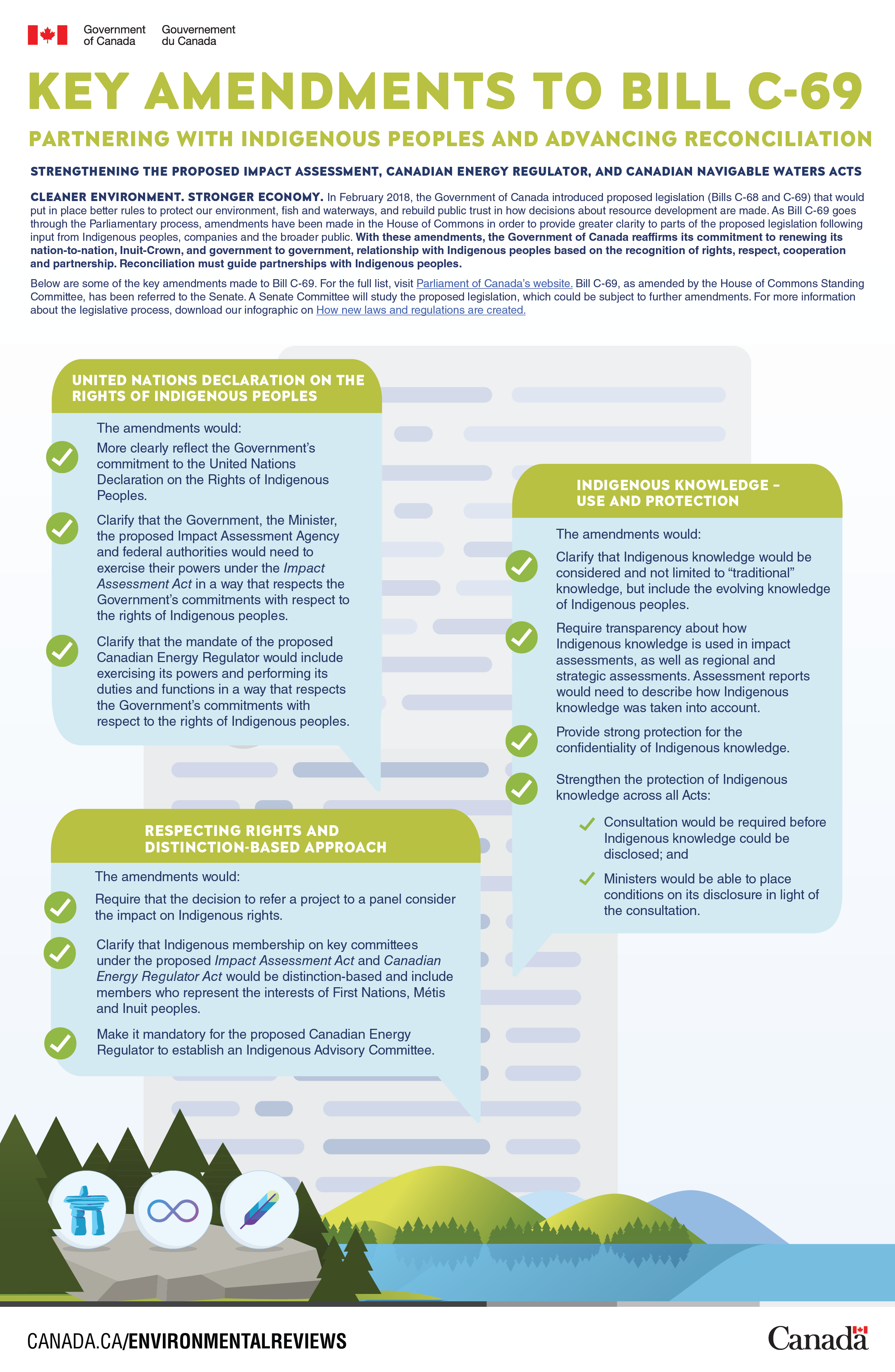Key Amendments to Bill C-69 for Indigenous Communities
Click on image to enlarge

Long description
Key Amendments to Bill C-69
Partnering with Indigenous Peoples and Advancing Reconciliation
Strengthening the Proposed Impact Assessment, Canadian Energy Regulator, and Canadian Navigable Waters Acts
CLEANER ENVIRONMENT. STRONGER ECONOMY. In February 2018, the Government of Canada introduced proposed legislation (Bills C-68 and C-69) that would put in place better rules to protect our environment, fish and waterways, and rebuild public trust in how decisions about resource development are made. As Bill C-69 goes through the Parliamentary process, amendments have been made in the House of Commons in order to provide greater clarity to parts of the proposed legislation following input from Indigenous peoples, companies and the broader public. With these amendments, the Government of Canada reaffirms its commitment to renewing its nation-to-nation, Inuit-Crown, and government to government, relationship with Indigenous peoples based on the recognition of rights, respect, cooperation and partnership. Reconciliation must guide partnerships with Indigenous peoples.
Below are some of the key amendments made to Bill C-69. For the full list, visit Parliament of Canada’s website. Bill C-69, as amended by the House of Commons Standing Committee, has been referred to the Senate. A Senate Committee will study the proposed legislation, which could be subject to further amendments. For more information about the legislative process, download our infographic on How new laws and regulations are created.
United Nations Declaration on the Rights of Indigenous Peoples
The amendments would:
- More clearly reflect the Government’s commitment to the United Nations Declaration on the Rights of Indigenous Peoples.
- Clarify that the Government, the Minister, the proposed Impact Assessment Agency and federal authorities would need to exercise their powers under the Impact Assessment Act in a way that respects the Government’s commitments with respect to
the rights of Indigenous peoples. - Clarify that the mandate of the proposed Canadian Energy Regulator would include exercising its powers and performing its duties and functions in a way that respects the Government’s commitments with respect to the rights of Indigenous peoples.
Indigenous Knowledge - Use and Protection
The amendments would:
- Clarify that Indigenous knowledge would be considered and not limited to “traditional” knowledge, but include the evolving knowledge of Indigenous peoples.
- Require transparency about how Indigenous knowledge is used in impact assessments, as well as regional and strategic assessments. Assessment reports would need to describe how Indigenous knowledge was taken into account.
- Provide strong protection for the confidentiality of Indigenous knowledge.
- Strengthen the protection of Indigenous knowledge across all Acts:
- Consultation would be required before Indigenous knowledge could be disclosed; and
- Ministers would be able to place conditions on its disclosure in light of the consultation.
Respecting Rights and Distinctions-Based Approach
The amendments would:
- Require that the decision to refer a project to a panel consider the impact on Indigenous rights.
- Clarify that Indigenous members on key committees under the proposed Impact Assessment Act and Canadian Energy Regulator Act would be distinction-based and include members who represent the interests of First Nations, Métis and Inuit peoples.
- Make it mandatory for the proposed Canadian Energy Regulator to establish an Indigenous Advisory Committee.